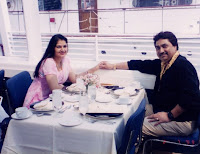Birth Name: Kedarnath Bhattacharya
Born: September 23, 1957 (age 54)
Kolkata, West Bengal, India
Origin Mumbai, Maharashtra, India
Genres: Playback singing
Occupations: Singer, Music Director, Playback Singer
Instruments: Tabla
Years active: 1984–present
Labels: Sony Music, T-Series, Tips, Saregama, Venus Records & Tapes
Wife Name: Saloni
Kumar Sanu (alias Kedarnath Bhattacharya, born in Kolkata) is a leading Indian Bollywood playback singer. He was awarded the Filmfare Best Male Playback Award over five consecutive years. The Government of India honoured him with the Padma Shri in 2009.
Early life
"Kumar Sanu's father Pashupati Bhattacharya was a vocalist and composer. He trained Sanu as a singer and tabla player. After getting a degree in commerce from Calcutta University, Sanu began performing publicly in 1979, singing at shows and restaurants around Calcutta. He modeled his singing style after Bollywood singer Kishore Kumar.[3] Later he developed his own singing style."
Kumar Sanu is one of the most popular playback singers of Bollywood. He holds the Guinness Book world record for recording the maximum number of songs in a day, which are 28. He was born on 23rd September, 1957 and was named Kedernath Bhattacharjee. His father, Pashupati Bhattacharjee was a renowned classical singer and composer who noticed his son's talent at a very young age. When he was still very young, his father trained him to sing classical music and play the tabla. Given here is a small biography which captures the life history of Kumar Sanu.
Kumar Sanu graduated in commerce from Calcutta University and then started giving public performances at small shows and restaurants in Calcutta itself. His style of singing was greatly influenced by the legendary Kishore Kumar. He badly wanted to become a playback singer but the competition in the Indian film is more than just fierce; it is ruthless. It took several years and a lot of struggle before Kumar Sanu was noticed by the great Jagjit Singh. He offered Kumar Sanu a chance to sing in the Hindi film Aandhiyan.
Kumar Sanu came to Bombay when Kalyanji - Anandji offered him to sing for the movie "Jadugar". He was then asked to adopt a different name that was much more acceptable due to caste/region preferences. Thus, he started to work under the name Kumar Sanu instead of Kedernath Bhattacharjee. This gave him a wider appeal with the masses and he did not remain restricted to the Bengali mass. His real achievement however, came in the year 1990 with the movie "Aashiqui".
The talented music directors Nadeem - Shravan gave him all but one song of the movie Aashiqui. Kumar Sanu proved himself with this opportunity and the songs took the entire nation by rage. Everyone hummed the songs that were touted as that year's biggest hits. Kumar Sanu became a star and also won his first Filmfare award as the Best Male Playback singer. He began recording for many more films and achieved much success with more and more hits. Some movies that are worth the mention are Saajan, Deewana, Baazigar, and 1942: A Love Story.
He won five Filmfare awards for five consecutive years and by the end of 1990, he had sung for hundreds of films in different languages. However, during the prime of his career, he was diagnosed with throat cancer. He was under medication after which he sang chosen songs. He cut down on singing and branched out, giving public performances and also acting in Bengali and Hindi serials. Some of his popular songs are given below.
Aankhon Ki Gustakhiyan
Chori Chori Jab Nazarein Mili
Do Dil Mil Rahe Hain
Ek Ladki Ko Dekha
Jab Koi Baat Bigad Jaaye
Nazar Ke Saamne Jigar Ke Paas
Rim Jhim Rim Jhim
Teri Umeed Tera Intezaar
Tu Mile Dil Khile
Tujhe Dekha Toh Yeh Jana Sanam
Tumhe Apna Banaane Ki Kasam
More Details of Kumar Sanu and List of songs by Kumar Sanu









